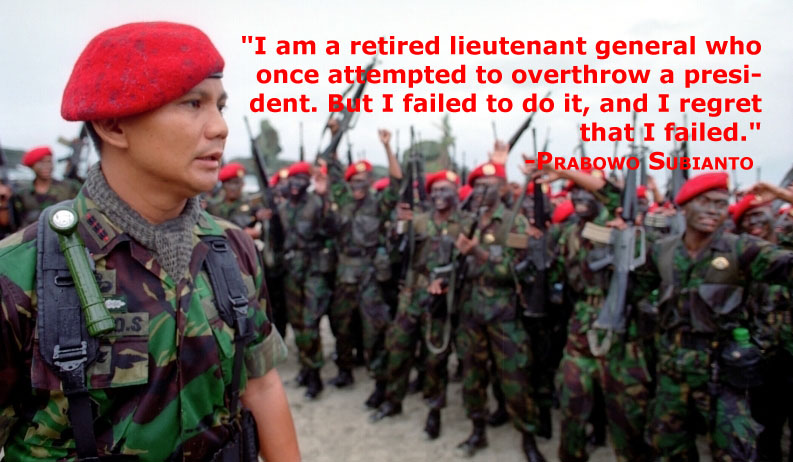In 1996, Prabowo led a team to secure the
release of environmental researchers taken
hostage by West Papuan guerrillas. He aborted
a planned Red Cross supervised release of
the hostages to prevent his
sister-in-law from getting credit.
According to Ed McWilliams, a
retired
U.S. diplomat, “The aborted hostage transfer
led to a brutal campaign of reprisal attacks
by the Indonesian military (largely Kopassus)
against highland villages.” This campaign
began with an assault from “an Indonesian
military helicopter disguised to look like
the helicopter that ICRC mediators had been
using” in violation of well-established
international humanitarian law.
 As the tumult associated with the East Asian
economic crisis in 1997-98 threatened the
political legitimacy of the Suharto regime,
Prabowo spearheaded campaigns to kidnap,
arrest, intimidate and torture student activists.
Protesting students at Trisakti
University were killed and wounded by
military snipers.
Prabowo has acknowledged his role in the
kidnappings, but has
said his “conscience is clear.” Convicted
by a court of honor for “exceeding orders,”
Prabowo was forced to retire.
As the tumult associated with the East Asian
economic crisis in 1997-98 threatened the
political legitimacy of the Suharto regime,
Prabowo spearheaded campaigns to kidnap,
arrest, intimidate and torture student activists.
Protesting students at Trisakti
University were killed and wounded by
military snipers.
Prabowo has acknowledged his role in the
kidnappings, but has
said his “conscience is clear.” Convicted
by a court of honor for “exceeding orders,”
Prabowo was forced to retire.
He is also accused of having a central role
in sparking the May 14, 1998 anti-Chinese
riots in Jakarta and other major urban areas.
At the time, Prabowo was head of the Kostrad
(the Army Strategic Reserve) based in the
capital. In 2003, the National Commission
on Human Rights (Komnas HAM)
accused Prabowo of responsibility
“for gross human rights violations that
occurred during the extensive rioting in
Jakarta in 1998.” The Komnas HAM
report said
that “security authorities at that time
failed to curb the widespread riots that
took place simultaneously.” The spread of
the riots was a result of a specific policy
based on the “similar pattern at almost
all places where the riots took place, which
began with provocation, followed by an attack
on civilians.”
Shortly before Suharto resigned, Prabowo,
backed by armed men, confronted the Army
Chief of Staff Gen. Subagio at his home.
The next morning Prabowo was removed as Kostrad
commander. Later that day, B.J. Habibie
succeeded Suharto as president, and Prabowo
demanded command of the military. On May
22, he
deployed troops around the presidential
palace. Prabowo
reportedly, “took his demotion badly
– at one point strapping on a sidearm,
summoning several truckloads of troops
and confronting guards at the
presidential palace as he tried to win
an audience” with Habibie. Soon after he
was forced to resign from the military.
In a speech in late 2012
he said, "I am a retired lieutenant
general who once attempted to overthrow
a president. But I failed to do it, and
I regret that I failed."
Recently, while campaigning in Aceh,
Prabowo
offered a vague apology for unnamed
actions his troops took there.

After leaving the military Prabowo went
into business and has tried to remake himself
as a populist, becoming president of the
Indonesian Farmers’ Association (HKTI) in
2004, while often arguing that Indonesia
needed a strong, guiding hand - his. The same year, he tried unsuccessfully
to become the Golkar (Suharto’s New Order
party) nominee for President. In 2009 he
was Megawati Sukarnoputri’s vice-presidential
candidate (a PDI-P/Gerindra split ticket).
Until recently, Prabowo led most opinion
polls of declared candidates for President.
Jakarta Governor Joko Widodo (Jokowi), who
officially entered the race in mid-March
as the PDI-P candidate, is the current favorite.
The
East Timor and Indonesia
Action Network
(ETAN) was founded in 1991. ETAN supports
democracy, human rights and justice in Timor-Leste,
West Papua and Indonesia. ETAN is non-partisan.
It works on issues and does not support
candidates or political parties in any country.
Website:
www.etan.org
Twitter: @etan009.
